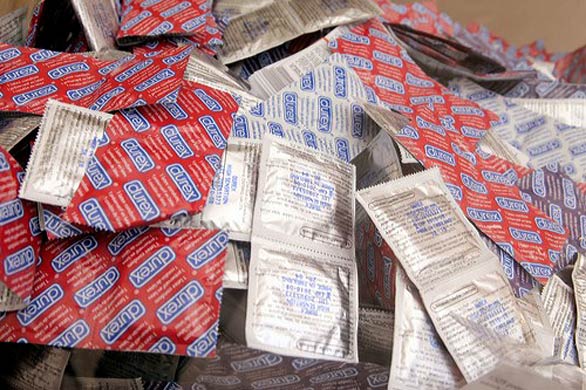
No laughing matter: counterfeit condoms at the Musée de la Contrefaçon
Photo credit: Yves Forestier / Getty Images
I’m all for combining tourism and trademarks. Next time I’m in Paris, I’m heading straight for the Musée de la Contrefaçon — the Museum of Counterfeiting. I just came across LA Times’ nice feature on the attraction, which the paper describes as a “postage stamp-sized palace” in the 16th arrondissement that is sort of a Noah’s Ark of French fashion: “two Lacoste crocodile shirts, two Hermès scarves, double doses of Birkins, hobos and clutches.” Of course, one’s real and one’s fake.
“The side-by-side comparisons are instructive, making such subtleties more readily apparent. But the museum’s most startling lessons unfold when the status goods that glow from the exhibits nearest the entrance give way to the stuff of everyday life. It’s here that the museum makes its strongest case for why consumers should care about counterfeiting.
“Exhibits are stocked with faux foodstuffs (including Tabasco, powdered milk, Laughing Cow cheese, Coca-Cola, Perrier and vermouth), tools (Swiss Army knives, Stanley tape measures), toys (poor quality ‘Babie’ dolls stand elbow to elbow with Barbies), car parts (oil filters, body panels, brake pads, ball bearings) and home appliances (pressure cookers) and, most frighteningly, health and beauty products such as condoms, pregnancy tests and Viagra — the only visible difference between the real and the fake being the shade of blue on the box.”
The article quotes the museum (and anti-counterfeiting trade group) president Marc-Antoine Jamet as saying people think of luxury goods when they think of counterfeiting. But they should be thinking about counterfeit medicine and airplane parts.
“It’s hard to be seen as a victim when you are talking about luxury goods,” he says. “But when you say [that] the people who make the fake perfumes and cosmetics also make fake medicine or products to clean your house, they listen to you more.”